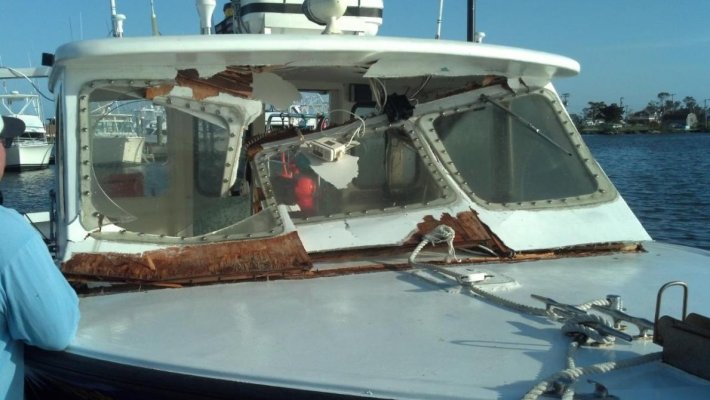Thanks for all the comments and noted risks. No, my current Progressive insurance will not cover such a trip. My fuel capacity is 500 gallons. Running at 8-8.5 knts with generator running for AC I get 1.6 nm/gallon. I'd run with prudent use of generator. Understand concern on forecasting. I have Sirius XM sat for weather. Yes on EPIRB I have already but I hadn't yet considered the bolstering the large windows or adding ballast. The "why" - Bermuda has been a sort of home away from home for me in my earlier years. Lived there fora year in 1971 and my parents had a summer cottage in Southampton from about 1967 to 1992. Know the island and the reefs like the back of my hand. Made hundreds of scuba dives there and even c-authored a Bermuda Dive Guide in the 1990s. My wife and I honeymooned in Bermuda and will be flying there in September for 40th anniversary. I'm an adventurer at heart and have thought about the crossing for some time now but until recently did not think I had enough experience to do it safety. BTW - my wife would not go on such a crossing. She prefers inland waterways. I'd need at least 2 additional crew and preferably 3 for easier helm shifts. I'm still mulling this over and do appreciate the feedback and raised points of concern guys!
Donsan, in post #31, posted some questions that you seem to have adeptly dodged. Adventurer at heart isn't relevant. Diver who knows Bermuda well isn't relevant. What is your boating/captaining experience and level of expertise. You say until recently you didn't think you had the experience. What changed other than convincing yourself, I assume not your experience.
The biggest issue isn't the boat, but the crew. Can one do it in a GB 42? Yes. Should one or would one or should you? Haven't convinced me. We delayed from one year to the next due to conditions (hurricane) and then made the trip with no problem but in a much larger boat. I'm not comfortable with your fuel safety factor. As to weather windows and forecasts, if you're talking 4 to 5 days, then you're never more than 2 to 2.5 days from the nearest shore. That gives you a good ability to react to any change in conditions and weather and sea forecasts are quite good for 72 hours and typically for longer. However, the boat in the discussion definitely says you want ideal conditions. Between waiting for an adequate window to cross and one to return you could turn your three hour tour into months. When we returned, we took a wide path toward the Bahamas to have good seas but then we had for more fuel capacity than required and more range than you would. I would say the average wait for a weather window adequate to make the crossing in the GB 42 would be 2 weeks to 2 months and you'd face the same returning.
Here's just a typical example. Today at 9:00 AM 5' at 7 seconds. Only problem is even if that was adequate you have 8' between Bermuda and NC and 12' by tomorrow. Just south of Bermuda is a very nice 3' at 6 seconds but you don't have the range to take advantage. By Sunday night you're talking 17'. Tuesday clears to 6' but by Thursday back to 12'. Now, obviously this isn't the ideal season but such patterns are not unusual at other times. You wouldn't have the luxury of being able to go any but the shortest route and that is very limiting. You can often find a month or even two months in which a crossing would be highly inadvisable. That means preparing the boat but waiting for months for an opening and means the same when returning.
People cross the gulf stream daily to the Bahamas. To Bimini you'd need less than 10 hours in your boat, to Nassau, you'd need up to 36 hours. That makes Nassau about 15 times as challenging on finding the opening. Now, multiply that another 10 times for the Bermuda distance, then double it for the open ocean location.
Have you ever crossed an ocean expanse with you as the captain? Would you have someone who has? Crossing the gulf stream and with the time involved, I'd want 30% fuel safety factor. Yes, greater than normal due to the impact conditions can have. Your 6 knots can quickly become 4 knots or require 50% more fuel.
As to what is in Bermuda, we loved it. Highlight was a local artist whose home we visited and she regaled us with decades of history and beautiful artwork. There's a mix of old and new. It's definitely not a rustic nature tour into the wilderness but a very sophisticated banking center.





